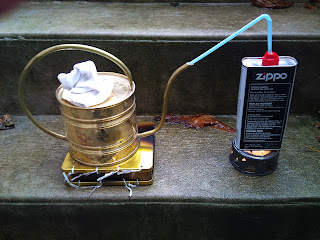Homemade White Gas "Still"
Almost everybody is familiar with the venerable Coleman suitcase stoves and pressurized lanterns - both of which run on what is known in N. America as "white gasoline". White gas, camp fuel and naphta are all different names for the same fuel. It is essentially a more refined version of gasoline (petrol for those of you in the UK!), with fewer smelly, carcinogenic compounds like benzene, toluene and octane-boosters. These additives are good for cars, but can clog stove generators and jets as they form viscous gums, which is why the more refined white gas does without them.
Unfortunately, the camp fuels sold at stores aren't cheap by any stretch of the imagination. Here, a 3.78L (1 US Gallon) can of the cheapest camp fuel fetches about $15.50. Well, what about regular gasoline then? It's relatively cheap, and readily available, but can clog stoves and burns with an odour. Following my grade 11 chemistry background, I decided to try making a "gasoline still". Because chemicals like hexane and octane boil at lower temperatures than other additives, boiling gasoline will yield vapours of chemicals I want, and the chemicals I don't want stay in the retort. The gasses pass through a tube and condense to liquid, then drip into a separate container.
Disclaimer: What I have done here is extremely dangerous, with potential for serious burns/loss of hair and/or dignity. If you should attempt to follow my example, godspeed to you! But, I do not accept any liability.
Not being one to spend much, I skipped the lab equipment and went straight to fabricating this odd contraption:
The Zippo lighter fluid can was filled with gasoline and then was boiled (very carefully!) over a candle flame. The gasoline boiled off and went through the straw into the watering can, where it condensed. It took a while, but eventually enough was collected to use.
The watering can was filled with a clear liquid and the Zippo can was filled with a yellow sludge, proving that there were a lot of additives. The clear liquid still smelled a little like gas, but not nearly as much as before. If one were able to control the temperature more, I'm sure the result would be even better.
The "white gas" I distilled burns fine in stoves, still with a bit of an odour, however. I hope to get some better equipment (and a hot plate for sure) to produce this faster and in greater volume, but as a proof of concept, I'd say it works!
Unfortunately, the camp fuels sold at stores aren't cheap by any stretch of the imagination. Here, a 3.78L (1 US Gallon) can of the cheapest camp fuel fetches about $15.50. Well, what about regular gasoline then? It's relatively cheap, and readily available, but can clog stoves and burns with an odour. Following my grade 11 chemistry background, I decided to try making a "gasoline still". Because chemicals like hexane and octane boil at lower temperatures than other additives, boiling gasoline will yield vapours of chemicals I want, and the chemicals I don't want stay in the retort. The gasses pass through a tube and condense to liquid, then drip into a separate container.
Disclaimer: What I have done here is extremely dangerous, with potential for serious burns/loss of hair and/or dignity. If you should attempt to follow my example, godspeed to you! But, I do not accept any liability.
Not being one to spend much, I skipped the lab equipment and went straight to fabricating this odd contraption:
 |
| Gasoline Still - note the high tech device (rag) used to prevent gases from escaping and causing a fire. |
The watering can was filled with a clear liquid and the Zippo can was filled with a yellow sludge, proving that there were a lot of additives. The clear liquid still smelled a little like gas, but not nearly as much as before. If one were able to control the temperature more, I'm sure the result would be even better.
The "white gas" I distilled burns fine in stoves, still with a bit of an odour, however. I hope to get some better equipment (and a hot plate for sure) to produce this faster and in greater volume, but as a proof of concept, I'd say it works!


Better living through chemistry ? Anyone ?
ReplyDeleteI find the DIY approach to distilling white gas quite ingenious.
ReplyDelete